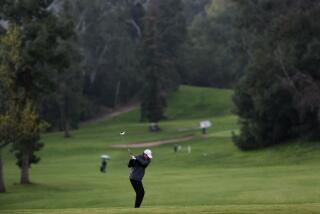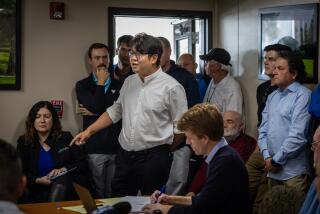U.S. Golf Club Manufacturer Carries A ... : Big Stick
- Share via
TOKYO — In this golf-crazy land, the Biggu Basa may be the ultimate American import success story.
The Biggu Basa-- as the Japanese have dubbed the Big Bertha golf club made by Carlsbad, Calif.-based Callaway Golf Co.-- draws much praise here.
“When you hit a ball that’s on the ground, it’s easy for it to go too low or off to the side. But if you use the Big Bertha, the ball goes up and falls,” explained Masayuki Kamioka, a businessman recently found inspecting clubs at a discount golf shop here.
Nobukazu Sakai, an architecture office employee who also works as a golf instructor, said Big Bertha’s oversized head gives the club an extra-large “sweet spot,” so that “the ball flies in the right direction and goes a long distance.”
But perhaps Big Bertha is a tad too successful for Callaway, which recently drew the wrath of some Japanese golf enthusiasts for what Callaway representatives say was a simple attempt to block fakes imported from Taiwan.
The crackdown also netted unauthorized importers of real Big Berthas. These so-called parallel importers were helping to meet soaring demand--and, in a small way, reduce Japan’s trade surplus with the United States--all at a lower cost to Japan’s famously eager golfers.
Last year, Callaway’s official distributor, Sumitomo Rubber Industries Ltd., imported 180,000 Callaway clubs, modified slightly for the Japanese market. But another 150,000 standard Callaway clubs were purchased in the United States by independent importers and brought to Japan for resale at prices lower than those charged for Sumitomo’s imports.
And, unhappily for Callaway, in recent years some Taiwan-based manufacturers have managed to get about 10,000 fake “Big Berthas” a year into Japan.
When Callaway convinced Japanese customs officials to crack down on counterfeits earlier this year, some Japanese smelled a scandal.
Customs officials in January suddenly blocked the import of all Callaway clubs except those handled directly by Sumitomo or other importers who had obtained Callaway’s express permission.
Big Bertha drivers imported through Sumitomo were selling at the time for about $500 each. But independent traders could get them for $200 or less in the United States and resell them here at much lower markups. To many, the action by customs looked like a blatant attempt to shut down sales of the cheaper parallel-import Big Berthas in order to maintain high-priced monopoly sales through Sumitomo.
Japanese magazines that had praised “Big Berthas” exploded with angry articles.
“The True Facts and the Repercussions of the Stopping of Callaway Parallel Imports! Will You Never Have Another Chance To Get Parallel Import Big Berthas!?” screamed a headline in Par Golf magazine.
“Callaway Moves to Destroy Parallel Imports,” declared Nikkei Trendy, a magazine specializing in coverage of popular new products. “Imports are Stopped by using Patent Rights as a Shield.”
Yasuo Nakagawa, Callaway’s Tokyo lawyer, said in an interview that the entire uproar resulted from Callaway’s determination to stop the import of fake clubs to Japan.
Under Japanese law and customs procedures, he said, once Callaway exercised its Japanese-registered “design patent” rights on Big Bertha clubs to get fakes blocked, customs began stopping all parallel imports. Basically, he said, it is too troublesome and time-consuming for customs officials to differentiate genuine clubs handled by parallel importers from the fakes.
“You could say that, in a way, Callaway is choking its own throat,” Nakagawa said.
The stopping of parallel imports will cut Callaway’s total sales significantly, he acknowledged. “Actually, some factory orders have already been canceled in the United States. But Callaway put precedence on its design patent right,” he said.
The action by customs’ officials came as a shock to parallel importers.
“A total of 500 Big Berthas we tried to import were stopped at customs,” said an independent importer who spoke on condition of anonymity.
“At first, we didn’t know what had happened, because we were importing real American products, not fakes,” he said. These clubs were being imported for clients who “were planning to sell Big Berthas, and had already advertised them . . . . They were using Big Bertha as an ‘eye catch’ for sales, so it was very important to them to get them. So this caused big trouble for them.”
Callaway took what it figured was a reasonable approach to this problem: Independent importers could bring in clubs stopped by customs, Nakagawa said, if they promised to discontinue such imports in the future and paid 2,000 yen--about $19 per club--in “damages” to reimburse the time and expense of a Callaway representative visiting the customs office to handle the procedures.
“We have no legal obligation to issue such consent,” Nakagawa added.
Some parallel importers were insulted, nevertheless.
“Customs wanted us to sign a letter of apology,” complained another importer, who also spoke on condition of anonymity. “There wasn’t room for negotiation. They just said, if you want to import those golf clubs, you have to pay 2,000 yen each, and we were supposed to sign a paper saying we’d never do it again. Our feeling was that the way customs treated us it was almost like we committed some kind of crime.”
Other importers tried to skirt the rules.
“This golf club was selling like mad,” said a U.S.-based Japanese trader. “The price is very expensive in Japan, so people like me, parallel importers, sent a lot of Big Berthas. If we send a lot of clubs, the price gets cheap. But they like to keep the price high . . . It is a very unreasonable decision by the Japanese government . . . They are just trying to be mean to us.”
When customs cracked down, this importer was stuck with a relatively modest stockpile of clubs in California. So he turned to friends for help.
“I asked about eight friends to help me carry these clubs to Tokyo,” he explained. “You say to customs, ‘I will give them to my family and friends.’ But actually, we do business.”
Many parallel importers also point out that if they were allowed to conduct their business more freely, they could contribute more to easing the huge trade imbalance between Japan and the United States. Japan’s surplus ran at $60 billion last year, provoking a sharpening of trade tensions.
“This is a very strange phenomenon, considering the current situation. Japan should be buying more American products. So we parallel importers think we are contributing to this country,” said an independent golf equipment wholesaler. “I’m puzzled by the fact that we are forced to stop the imports.”
While the parallel importers were angry, some foreign firms and designated importers handling other products thought they saw in Callaway’s actions a way to maintain monopoly distribution networks in Japan, Nakagawa said. Several contacted him for advice. But Nakagawa said he replied that Callaway was successful in stopping parallel imports only because its main purpose was to stop fakes.
“If you go to the customs office with the intent to stop parallel imports, the customs office will not accept it, because that’s clearly against the anti-trust law,” he said.
In recent weeks, Callaway’s new Big Bertha WarBird clubs have arrived in Japan, and sure enough, shops have two-tiered prices, one for Sumitomo’s imports and a cheaper price for parallel importers’ goods.
Customs has let independent importers back into the business because there aren’t any fakes out yet on the Big Bertha WarBird, said Yuji Hattori, manager of a golf shop in Tokyo’s discount-oriented Okachimachi district. “The old version has been stopped at customs,” he explained. “But the new version is coming through.”
Times Researcher Chiaki Kitada in Tokyo contributed to this report.
More to Read
Inside the business of entertainment
The Wide Shot brings you news, analysis and insights on everything from streaming wars to production — and what it all means for the future.
You may occasionally receive promotional content from the Los Angeles Times.










